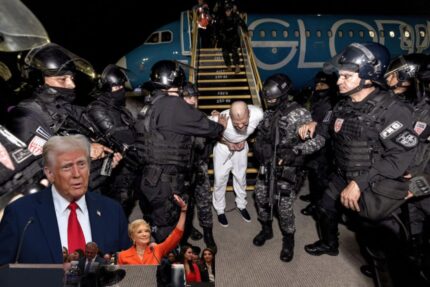A constitutional showdown is unfolding in the United States after the Trump administration deported over 250 alleged gang members, primarily Venezuelans, despite a federal court order halting such actions.
On Saturday evening, U.S. District Judge James Boasberg issued a 14-day restraining order barring the administration from using the Alien Enemies Act—a wartime statute dating back to 1798—to justify these deportations. However, the administration proceeded with the removals, arguing that the judiciary lacks authority over presidential decisions in foreign affairs.
White House Press Secretary Karoline Leavitt defended the decision, stating, “A single judge in a single city cannot direct the movements of an aircraft … full of foreign alien terrorists who were physically expelled from U.S. soil.” The administration insists that immigration enforcement is an executive function, and federal courts have no jurisdiction over presidential foreign policy.
Deportees Arrive in El Salvador, Placed in Maximum-Security Prison
El Salvador’s President Nayib Bukele confirmed the arrival of 238 alleged members of the Venezuelan Tren de Aragua gang and 23 members of MS-13. Upon landing, the deportees were immediately transferred to El Salvador’s Terrorism Confinement Center (Cecot), a maximum-security prison known for its harsh conditions.
The facility, which Bukele has championed as a model for cracking down on gang violence, has faced widespread criticism from human rights groups. Reports indicate that detainees face severe overcrowding, limited access to legal representation, and harsh disciplinary measures. Nevertheless, Bukele defended his decision to accept the deportees, stating, “El Salvador will not be a safe haven for criminals.”
Legal Experts: Trump’s Actions ‘Beyond the Pale’
The administration’s reliance on the Alien Enemies Act has alarmed constitutional scholars and civil rights advocates, who argue that the law was historically used only in wartime and against hostile foreign nations.
Patrick Eddington, a homeland security expert at the Cato Institute, condemned the move as “open defiance” of the judiciary, calling it one of the most radical constitutional challenges in U.S. history. The American Civil Liberties Union (ACLU) has filed legal challenges, asserting that federal courts retain jurisdiction over deportations, even if the individuals are no longer on U.S. soil.
Judge Boasberg ruled that the Alien Enemies Act applies to state-backed hostile actions that are “commensurate to war”, not criminal gangs or unauthorized migrants. However, President Trump has argued that the surge in illegal immigration constitutes a national security crisis akin to wartime conditions.
Political and Diplomatic Fallout
The deportations have sparked political and diplomatic tensions, with U.S. allies and human rights groups raising concerns about the lack of due process in the removals.
In Washington, Secretary of State Marco Rubio praised Bukele as “the strongest security leader in our region”, lauding El Salvador’s role in tackling transnational crime. However, critics highlight the financial burden placed on El Salvador and question whether sufficient evidence exists to confirm the deportees’ gang affiliations.
Domestically, the move has further deepened partisan divisions. Republicans have applauded Trump’s hardline stance on immigration, while Democrats have accused the administration of trampling on judicial authority and undermining the rule of law.
Constitutional Crisis: Executive vs. Judiciary
This incident marks a major constitutional clash between the executive and judicial branches of the U.S. government, raising critical questions about the separation of powers.
Trump’s insistence that the judiciary cannot interfere with immigration enforcement sets a dangerous precedent, legal scholars warn. If upheld, it could erode the authority of federal courts in restraining executive actions, particularly in matters of national security and foreign policy.
As legal battles escalate, the Supreme Court may ultimately be called upon to determine whether a president can unilaterally override judicial rulings on immigration matters. In the meantime, the Trump administration remains unapologetic, with the president stating aboard Air Force One, “I can tell you this: these were bad people.”














